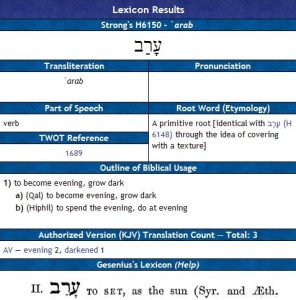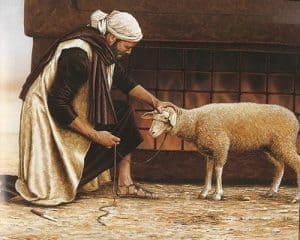So when does a Genesis day begin – in the evening or morning?

Genesis 1 has more mistranslations in any one chapter than in any other book of the Hebrew Bible, starting with the very first word, which is a normal construct in Hebrew, “ Young’s Literal translation has it correct, “In the beginning of…” (YLT). The difference is not trivial, but has profound implications for the philosophy of time and Biblical Chronology. So when does a Genesis day begin and where does scripture clearly indicate that the morning or evening starts the Genesis day in our Bible?
The Genesis Day in the Bible.
“and God calleth to the light ‘Day,’ and to the darkness He hath called ‘Night;’ and there is an evening, and there is a morning – day one.” (YLT). In Hebrew (MT) Gen 1:5 is rendered as:
וַיִּקְרָ֨א אֱלֹהִ֤ים׀ לָאוֹר֙ י֔וֹם וְלַחֹ֖שֶׁךְ קָ֣רָא לָ֑יְלָה וַֽיְהִי־עֶ֥רֶב וַֽיְהִי־בֹ֖קֶר י֥וֹם אֶחָֽד׃ פ
way-yiq-rā – then He called וַיִּקְרָ֨א
’ĕ-lō-hîm – the Almighty אֱלֹהִ֤ים׀
lā-’ō-wr – light לָאוֹר֙
yō-wm, – day י֔וֹם אֶחָֽד
First he calls the light day.
וַיִּקְרָ֨א אֱלֹהִ֤ים׀ לָאוֹר֙ י֔וֹם וְלַחֹ֖שֶׁךְ קָ֣רָא לָ֑יְלָה וַֽיְהִי־עֶ֥רֶב וַֽיְהִי־בֹ֖קֶר י֥וֹם אֶחָֽד׃ פ
wə-la-ḥō-šeḵ – and darkness וְלַחֹ֖שֶׁךְ
qā-rā – he has been calling קָ֣רָא
lā-yə-lāh – night לָ֑יְלָה
The text then switches to a conjunctive waw, “and darkness” followed by a switch in verbal tense to “he has been calling night”. Added background information here for darkness, does not interrupt the sequence in the provision of detail. So it is NOT introduced with a consecutive waw, as if to say, “then he called the darkness night” which would make it hard to say “then there was setting” right afterwards. English does not use a perfect for this purpose but uses a gnomic present tense, “he calls”.
וַיִּקְרָ֨א אֱלֹהִ֤ים׀ לָאוֹר֙ י֔וֹם וְלַחֹ֖שֶׁךְ קָ֣רָא לָ֑יְלָה וַֽיְהִי־עֶ֥רֶב וַֽיְהִי־בֹ֖קֶר י֥וֹם אֶחָֽד׃ פ
wa-ye-hi – then there was וַֽיְהִי־
ereb – setting עֶ֥רֶב
wa-ye-hi – then there was וַֽיְהִי־
boqer – daybreak בֹ֖קֶר
yō·wm ’e·ḥāḏ – day one י֥וֹם אֶחָֽד
Then וַֽיְהִי־ there was setting. Then וַֽיְהִי־ there was daybreak. The waw consecutive here (translated then) shows that the “evening”, or more literally “setting” in Hebrew, follows next in time after the day: Then there was…. Thus, the setting of each day is always after the creative acts of the day. The setting and the daybreak mark the boundaries of the night that follows the day.
. . . ‘then there was setting’ . . . NOT evening.
 The word עֶרֶב is derived from the verbal root ערב, which means “go down,” “grow dark,” “set” (HALOT, BDB, Holladay). This Hebrew verb, by regular rules, is formed into a noun. It is important to note that עֶרֶב means “going down,” “setting,” or “growing dark.” Everett Fox, translator of the Schocken Bible, renders “There was setting, there was dawning: one day” The sequence is established, first setting, then daybreak.
The word עֶרֶב is derived from the verbal root ערב, which means “go down,” “grow dark,” “set” (HALOT, BDB, Holladay). This Hebrew verb, by regular rules, is formed into a noun. It is important to note that עֶרֶב means “going down,” “setting,” or “growing dark.” Everett Fox, translator of the Schocken Bible, renders “There was setting, there was dawning: one day” The sequence is established, first setting, then daybreak.
Erev, עֶ֥רֶב setting and the Passover Lamb.
The King James Version mistranslated, “And the evening and the morning were the first day.” The KJV deletes the verb twice, turning it into two noun phrases, and then inserts the verb at the end of the sentence where it does not belong. The effect is to form an equation: evening + morning = 1 day. The first phrase in the KJV “And the evening” is a noun phrase, and the second clause “and the morning” is also a noun phrase. Noun phrases in Hebrew only take waw conjunctive.
In Hebrew the words are verb phrases, “Then there is setting. Then there is daybreak: one day.” Verb phrases in Hebrew take the waw consecutive, and such is the case here. Where the KJV inserts the word “were” in “were the first day,” there is no verb at all in the Hebrew. The mistranslation is so atrocious to anyone knowing Hebrew that the only sound conclusion is that the KJV translators vested interest was not in achieving accuracy, but in maintaining the tradition that a Scriptural calendar day is from sunset to sunset. And choosing tradition above the words and commandments of God is not faithfulness.
We will slowly discover that understanding a Biblicaly correct and scriptural calendar day cycle is from dawn / sunrise to dawn / sunrise and is essential for understanding nearly everything in biblical chronology having to do with days. Correct observance of the Torah is otherwise bound to go off track, or at the very least to be rendered confusing. Also you will find that correct understanding of the Levitical services and how days are timed for offerings depends wholly on the dawn to dawn day. Finally, the dawn to dawn day is necessary to properly understand Messiah’s death and resurrection and the prophesies of the ‘third day.’

Let us now examine and breakdown Exo 12:6 which describes the timing of the Passover lamb, the second of the daily offerings:
The Passover lamb (Exo 12:6) was to be slain ‘between the settings’ on the 14th day of Aviv – the first month of the Hebrew year. And ye shall keep it up until the fourteenth day of the same month: and the whole assembly of the congregation of Israel shall kill it in the evening.
Conclusive grammatical and contextual proof that setting עֶ֥רֶב is the diminishing of a light source NOT evening.
The Passover lamb was to be slain ‘between the settings’ (בֵּין הָעַרְבָּיִם) on the 14th day. The Hebrew word baeyn (בֵּין) means ‘between.’ Ha- (הָ) means ‘the,’ and ervayim (עַרְבָּיִם) is made of the word erev (עֶרֶב) and the dual ending ayim (יִם). The dual ending is often confused with the plural ending iym. The dual ending means a plural of two. The word עֶרֶב means the ‘setting’, or the ‘going down’ of a light source. The definition ‘sunset’ is avoided because the word is used in Genesis that do not involve the sun, but only the light that the Almighty created. Strictly erev עֶרֶב refers to ‘setting’ of some light source.
Exo 12:6 קְהַ֥ל עֲדַֽת יִשְׂרָאֵ֖ל בֵּ֥ין הָעַרְבָּֽיִם׃
When Does a Biblical day Start? by Daniel Gregg
 These considerations show that baeyn ha-ervayim means a time in the middle of the setting of the light, beginning at the earliest at 1st) noon and ending at the 2nd) latest with the last dusk on the 14th day of the first month, the month of Passover.
These considerations show that baeyn ha-ervayim means a time in the middle of the setting of the light, beginning at the earliest at 1st) noon and ending at the 2nd) latest with the last dusk on the 14th day of the first month, the month of Passover.
Many translations of the phrase baeyn ha-ervayim interpret it to mean ‘twilight.’ While it may be true that ‘between the settings’ includes an element of twilight, it only means the ‘twilight’ belonging to the literal day going before the twilight. Also, the translation ‘twilight’ is not literal. It is an interpretation, and it is clearly too restrictive because it excludes all time before sunset that the sun is ‘setting.’ The usage of the term by most Jews applies it to the afternoon, which is when the Passover offerings were actually brought. The Jewish Historian Josephus, writes about the Passover practice during the time of Messiah, “they slay their sacrifices, from the ninth hour till the eleventh” (Jos. Wars 6:423). The hours are counted from daybreak, so in Roman time this is 3 pm to 5 pm. Also as a type of Passover lamb, Messiah died at the ninth hour, which is 3 pm.
Erev עֶ֥רֶב is stated to be the time that women go out of a city to draw water (cf. Gen. 24:11). The ordinary time to draw water was late afternoon, which reveals that erev עֶ֥רֶב means afternoon.

Jeremiah also gives us a contextual definition, Prepare war against her; Arise, and let us attack at noon. Woe to us. For the day turns, and evening עֶ֥רֶב shadows stretch out (Jeremiah 6:4).

Shadows disappear at sunset, and are not observed stretching out during twilight. Jeremiah’s usage is sensible because erev עֶ֥רֶב means afternoon. The account of Elijah and the prophets of Baal also uses erev עֶ֥רֶב in context to mean afternoon (1 Kings 18:29). They prophesied until early afternoon. Then at the time of the erev עֶ֥רֶב sacrifice הַמִּנְחָ֑ה, fire came down from heaven. Elijah sends his servant to observe the sea seven times. He sees a cloud, which turns into a rainstorm. Naturally, erev עֶ֥רֶב means afternoon allowing the time line to flow smoothly without cramping events.
Numbers 28:3 states that two lambs are offered each day for the continual daily offering. One is offered at daybreak, and the second is offered baeyn ha-ervayim הָעַרְבָּֽיִם. If we assume this means after sunset and that the day ends at sunset, this is a contradiction, since the second offering of the day would then become the first offering of the next day, and the first offering in the text would become the second on the next day. Therefore, the assumption that baeyn ha-ervayim means after sunset, i.e. on the next day, contradicts counting the first and second lamb each day. The only meaningful definition of baeyn ha- ervayim then that avoids this contradiction and agrees with the usages above, is ‘afternoon.’ It is meaningful because the Hebrew means ‘between the settings’ and the first setting begins at noon, and the second setting occurs at sunset. Between these times is mid-afternoon or about 3 pm.
Excepts used from ‘When Does the Day Begin,’ Torahtimes, by Daniel Gregg, and Biblehub.com.
Some further scriptural evidence.
C. H. Leupold (Exposition of Genesis, Vol. 1, pp. 57-58) states: [Gen. 1:5], presents not an addition of items but the conclusion of a progression. On this day there had been the creation of heaven and earth in the rough, then the creation of light, the approval of light, the separation of day and night. Now with evening the divine activities ceased: they are works of light not works of darkness. The evening “erbhof” merges into night and the night terminates with morning. But by the time morning is reached, the first day is concluded, as the account says succinctly, ‘the first day,’ and everything is in readiness for the second day’s task. For ‘evening’ marks the conclusion of the day, and ‘morning’ marks the conclusion of the night. It is these conclusions, which terminate the preceding, that are to be made prominent.”
Dear hebraic-roots! What is about the cronology of the “3 day&night prophecy” of the Messiah in case of starting the day in the morning? I’m really curious about it. You mentioned that “the sign of Jonah” is also a good example for proving the morning day-start. But I found nothing about it here. Probably I’m a bit unperceptive. Thank you.
Hi
I have taken the liberty to add you to our Renewed Moon Update Newsletter
You will find a link on this page to: When Does a Biblical Day Begin According to Scripture
You will be able to download the study which includes the Hebrew understanding of Genesis 1:5, and how this relates to the Exodus / Temple Services and the / Death & Resurrection of Messiah Yeshua